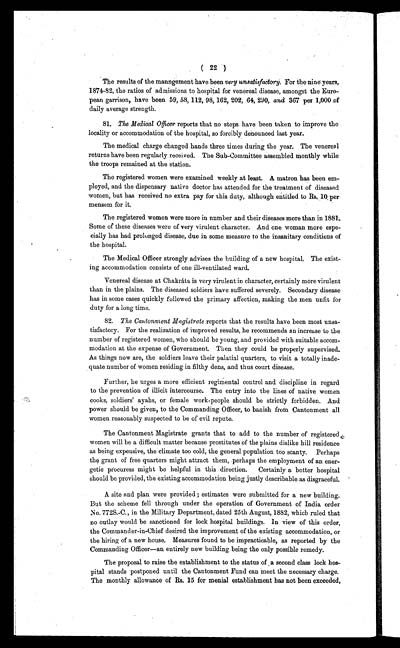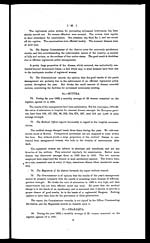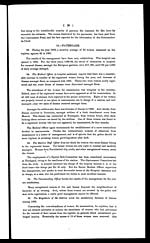Medicine - Institutions > Lock hospitals > Annual report on the working of the lock hospitals in the North-Western Provinces and Oudh > 1882
(332) Page 22
Download files
Individual page:
Thumbnail gallery: Grid view | List view

( 22 )
The results of the manngement have been very unsatisfactory. For the nine years,
1874-82, the ratios of admissions to hospital for venereal disease, amongst the Euro-
pean garrison, have been 59, 58, 112, 98, 162, 202, 64, 290, and 367 per 1,000 of
daily average strength.
81 The Medical Officer reports that no steps. have been taken to improve the
locality or accommodation of the hospital, so forcibly denounced last year.
The medical charge changed hands three times during the year. The venereal
returns have been regularly received. The Sub-Committee assembled monthly while
the troops remained at the station.
The registered women were examined weekly at least. A matron has been em-
ployed, and the dispensary native doctor has attended for the treatment of diseased
women, but has received no extra pay for this duty, although entitled to Rs. 10 per
mensem for it.
The registered women were more in nnmber and their diseases more than in 1881.
Some of these diseases were of very virulent character. And one woman more espe-
cially has bad prolonged disease, due in some measure to the insanitary conditions of
the hospital.
The Medical Officer strongly advises the building of a new hospital. The exist-
ing accommodation consists of one ill-ventilated ward.
Venereal disease at Chakráta is very virulent in character, certainly more virulent
than in the plains. The diseased soldiers have suffered severely. Secondary disease
has in some cases quickly followed the primary affection, making the men unfit for
duty for a long time.
82. The Cantonment Magistrate reports that the results have been most unsa-
tisfactory. For the realization of improved results, he recommends an increase to the
number of registered women, who should be young, and provided with suitable accom-
modation at the expense of Government. Then they could be properly supervised.
As things now are, the soldiers leave their palatial quarters, to visit a totally inade-
quate number of women residing in filthy dens, and thus court disease.
Further, he urges a more efficient regimental control and discipline in regard
to the prevention of illicit intercourse. The entry into the lines of native women
cooks, soldiers' ayahs, or female work-people should be strictly forbidden. And
power should be given, to the Commanding Officer, to banish from Cantonment all
women reasonably suspected to be of evil repute.
The Cantonment Magistrate grants that to add to the number of registered
women will be a difficult matter because prostitutes of the plains dislike hill residence
as being expensive, the climate too cold, the general population too scanty. Perhaps
the grant of free quarters might attract them, perhaps the employment of an ener-
getic procuress might be helpful in this direction. Certainly a better hospital
should be provided, the existing accommodation being justly describable as disgraceful.
A site and plan were provided ; estimates were submitted for a new building.
But the scheme fell through under the operation of Government of India order
No. 772S.-C., in the Military Department, dated 25th August, 1882, which ruled that
no outlay would be sanctioned for lock hospital buildings. In view of this order,
the Commander-in-Chief desired the improvement of the existing accommodation, or
the hiring of a new house. Measures found to be impracticable, as reported by the
Commanding Officer—an entirely new building being the only possible remedy.
The proposal to raise the establishment to the status of a second class lock hos-
pital stands postponed until the Cantonment Fund can meet the necessary charge.
The monthly allowance of Rs. 15 for menial establishment has not been exceeded,
Set display mode to: Large image | Zoom image | Transcription
Images and transcriptions on this page, including medium image downloads, may be used under the Creative Commons Attribution 4.0 International Licence unless otherwise stated. ![]()
| India Papers > Medicine - Institutions > Lock hospitals > Annual report on the working of the lock hospitals in the North-Western Provinces and Oudh > 1882 > (332) Page 22 |
|---|
| Permanent URL | https://digital.nls.uk/75111867 |
|---|




